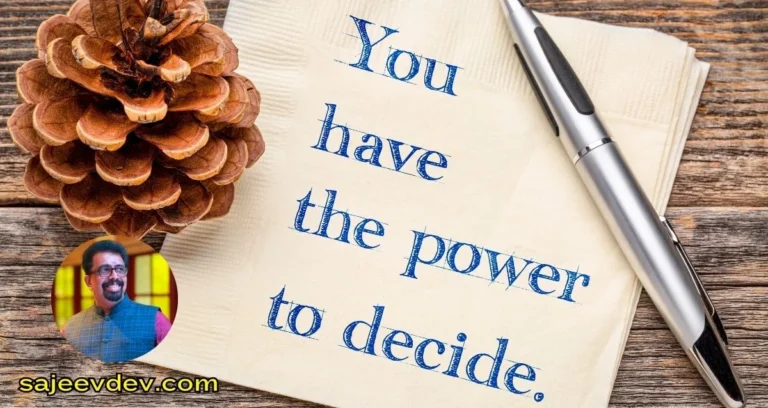
The article “Shashi Tharoor Explains How India Turned the Tables in UN Discussions!”2025
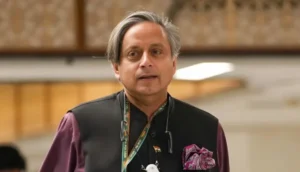
India has frequently had to negotiate a maze of conflicting interests, historical prejudices, and geopolitical scheming in the intricate world of international diplomacy, where countries compete for influence and moral superiority. However, India has become a powerful voice on the global scene in recent years, especially inside the prestigious United Nations. Shashi Tharoor, one of India’s most articulate diplomats and public intellectuals, gave a masterclass in how India has strategically flipped the tables in UN discussions, reshaping narratives and asserting its position as a global leader in an engrossing speech that has generated a lot of discussion.
Government Takes Action
The Historical Context: India’s Journey in the UN
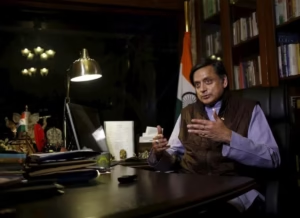
Understanding the historical context is crucial to comprehending how India has changed the nature of UN discussions. Even before gaining independence from British colonial rule in 1947, India became a founding member of the United Nations in 1945. India’s anti-colonial heritage and dedication to values like sovereignty, equality, and non-alignment gave it a distinct viewpoint at the UN as a country that emerged from a fight for self-determination.
Tharoor’s Thesis: The Power of Narrative
The central tenet of Tharoor’s argument is that diplomacy involves both narrative and policy. India was too long depicted—often unjustly—as a country enmeshed in poverty, internal conflict, and developmental obstacles. Although these problems existed, critics regularly used them as a weapon to damage India’s reputation in international fora. According to Tharoor, India has made a concerted effort to reclaim and rewrite this story, portraying itself as a self-assured, competent, and vital actor in world affairs rather than as a helpless victim.
1. Reframing India’s Identity
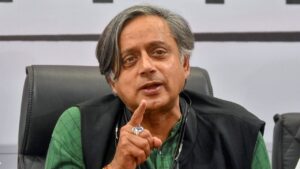
Redefining India’s global identity has been one of its main strategies, as Tharoor explained. Instead of letting antiquated stereotypes rule, India has established itself as a link between the developed world and the Global South. It has achieved this by highlighting its technological prowess, cultural heritage, and democratic credentials. For example, India’s ability to contribute to global public goods has been highlighted by its leadership in projects like the International Solar Alliance and its role as a vaccine supplier during the COVID-19 pandemic (often referred to as “Vaccine Maitri”).
2. Championing the Global South
According to Tharoor, India’s steadfast dedication to the Global South has been a pillar of its diplomatic strategy. India has long positioned itself as a voice for developing countries, supporting causes such as climate justice, fair resource distribution, and international institution reform. In UN forums, where many nations from Asia, Latin America, and Africa share India’s frustrations with the injustices of the current global order, this position has struck a deep chord.
3. Mastering the Art of Diplomacy
Tharoor cited India’s advocacy for reform of the UN Security Council as one noteworthy example. India has long advocated for a permanent seat on the Security Council, claiming that the current setup is out of date and does not take into account the realities of the twenty-first century. A wide range of countries, including those in Africa and Latin America, who also feel excluded by the power dynamics within the UN, have supported India by presenting this demand as a component of a larger call for inclusivity and representation.
Key Moments Where India Turned the Tables
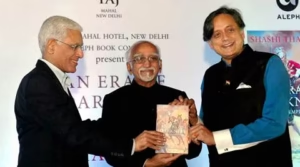
Tharoor’s speech was peppered with examples of specific instances where India’s diplomatic ingenuity shone through. These moments illustrate how India has used a combination of moral authority, strategic alliances, and rhetorical prowess to shift the terms of debate in its favor.
1. The Paris Climate Agreement (2015)
Despite its low per-capita emissions and developmental needs, developed nations pressed India to commit to aggressive emissions reductions during the Paris Climate Agreement negotiations. By focussing on the idea of “common but differentiated responsibilities,” India’s negotiators, led by then-Environment Minister Prakash Javadekar, reversed the situation, according to Tharoor. India was able to obtain concessions that permitted it to prioritise economic growth while maintaining its commitment to sustainable development by drawing attention to the historical responsibility of industrialised
2. Countering Narratives on Kashmir
Addressing controversial topics like Kashmir in UN forums is another way that India has shown its diplomatic prowess. Tharoor described how India has continuously emphasised the issue’s status as an internal matter in order to thwart attempts by some nations to internationalise it. India has diverted criticism and redirected attention to problems like cross-border terrorism by citing the UN Charter’s fundamental principles of sovereignty and non-interference.
3. Peacekeeping and Humanitarian Contributions
Moreover, India’s humanitarian efforts—such as providing aid during natural disasters or medical supplies during pandemics—have bolstered its soft power. Tharoor noted that these contributions are frequently cited by Indian diplomats to underscore the country’s commitment to global stability and welfare.
The Road Ahead: Challenges and Opportunities
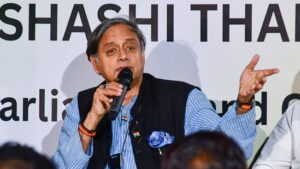
Tharoor was open about the difficulties that still exist, despite the fact that India has made great progress in demonstrating its influence at the UN. The degree of reform that is feasible is still constrained by the P5’s firmly established authority, especially their veto power in the Security Council. In addition, India has to maintain its leadership position in the Global South while navigating a challenging geopolitical environment that includes juggling its ties with superpowers like the US, China, and Russia.
Conclusion: A New Era for Indian Diplomacy
A fascinating look into the art and science of contemporary diplomacy can be found in Shashi Tharoor’s observations on India’s changing position in UN debates. India has turned the tide and become a key player in global governance by redefining its identity, supporting the Global South, and becoming an expert in the complexities of UN processes. India’s capacity to influence the discourse and promote a more just global order will be essential as the globe struggles with issues like pandemics, climate change, and geopolitical tensions.
Tharoor’s speech serves as a reminder that persuasion, principle, and tenacity are just as important in diplomacy as power. Although India’s path to global leadership is far from finished, the nation has already shown that it can compete on the international scene and then some, as Tharoor so eloquently illustrated.


